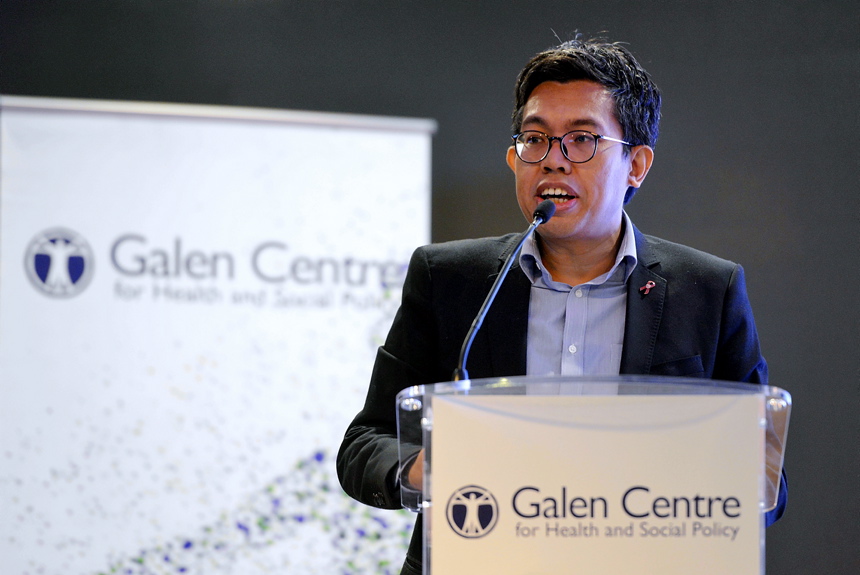KUALA LUMPUR, Oct 24 — A think tank has proposed earmarking 5 per cent of tobacco and alcohol taxes, an estimated RM290 million, for additional health funds ahead of the tabling of Budget 2019.
The Galen Centre for Health and Social Policy said as a pilot programme, the minimum annual collection of RM290 million (based on 2017 sin tax revenue figures from tobacco and alcohol) should go towards health promotion and treatment for non-communicable diseases (NCDs), specifically diabetes and cancer.
“They should act as additional or supplementary funding, necessary to support upscaling of innovative programmes or fund crucial lifesaving medicines and treatment,” Galen Centre authors Azrul Mohd Khalib and Jade See said in their paper titled “Innovate for health: Earmarking sin tax to support Malaysia’s NCD response”.
“The Ministry of Health, together with a multisectoral oversight committee, would then manage these funds. It is important that these earmarked funds are not used to offset reductions or funding cuts to existing allocations under the national budget,” added the paper released today.
Currently, sin tax revenue from cigarettes, tobacco products, and alcohol—which comprised almost half, or 49.7 per cent, of all excise duties collected in 2017 — is consolidated with other government revenue.
Last year, RM3.94 billion in sin tax was collected from cigarettes and tobacco products, compared to RM1.92 billion from alcoholic beverages, totaling about RM5.9 billion.
This year, the Finance Ministry estimated at least RM4.1 billion in excise duties from cigarettes and tobacco products, as well as about RM2 billion from alcoholic beverages, totaling about RM6.1 billion.
Galen Centre pointed out that Malaysia’s health care expenditure was 4.3 per cent of the gross domestic product (GDP) in 2017, 3 per cent lower than the World Health Organisation’s 7 per cent recommendation for the upper middle income country. Out of that, 2.3 per cent and 2.1 per cent were from public and private spending respectively.
Last year, the previous Barisan Nasional (BN) administration allocated about RM27 billion for health in the 2018 Budget.
“As more than 70 per cent of the population access public healthcare, especially those from B40 (bottom 40 per cent) households, the cold reality is that the government must spend more to provide quality care and adequate coverage,” said Galen Centre.
NCDs accounted for more than 73 per cent of total deaths, said Galen Centre. At least 63 per cent of the population is at risk of at least one NCD, which includes cardiovascular diseases, diabetes, cancer, obesity, and hypertension.
There is an estimated 3.6 million adult Malaysians living with diabetes, 6.1 million with hypertension, 9.6 million with hypercholesterolemia, and 3.3 million with obesity. One in four Malaysians is estimated to be living with cancer, said Galen Centre.
Treatment of cancer, diabetes, and cardiovascular diseases combined cost Malaysians about RM11 billion annually from public and private funds, according to Galen Centre.
Allocations for a Health Ministry programme to address prevention and control of both NCDs and communicable diseases were only RM80 million in 2017, dropping to RM30 million this year.
“Generally, current investments in health promotion, NCD prevention and control activities are woefully inadequate. The public healthcare system is struggling under the overbearing escalating cost and burden of treatment for NCDs,” said Galen Centre.
The think tank said at least 80 countries practiced earmarking for health. More than 35 nations earmark sin tax revenues, specifically tobacco and alcohol taxes, for health.
“Earmarking sin taxes for health expenditure can also insulate health spending from fluctuation and competition from other national needs, particularly when government or healthcare funds are low or unstable,” said Galen Centre.
“It is thus suitable to be allocated to specific areas of requiring high levels of investment over a long term period, such as the prevention and treatment of noncommunicable diseases such as cancer.”
Among the disadvantages of earmarking sin tax for health, Galen Centre said, was the possibility of further excise duty hikes.
The think tank, however, cited successes in Australia and Thailand in earmarking sin tax for health promotion activities.
“In general, utilising sin taxes for the purposes of healthcare financing is perceived to be politically acceptable across many countries, including countries in Southeast Asia.
“Using such taxes to finance public health expenditures could be perceived by the public as ‘taking away’ from the ‘bad’ and doing ‘good’ with the proceeds, thus contributing to the social good,” said Galen Centre.




















